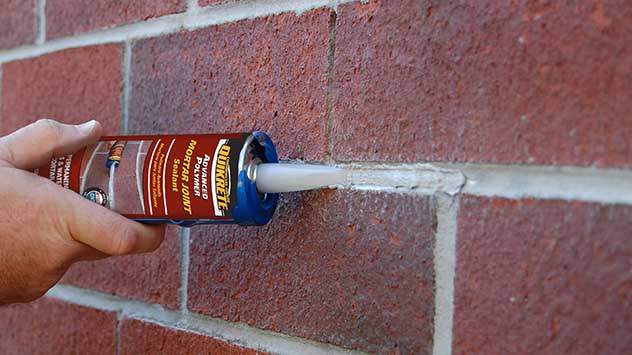[ad_1]

Over time, mortar cracks make brick vulnerable to water and weaken the structure. Mortar joint sealant is an easy long-term fix. (DepositPhotos)
Brick homes and chimneys are durable and built to last thanks to mortar joints that take the brunt of damage caused by wall movement, foundation settlement and exposure to elements.
A buffer between the bricks, mortar joints are designed to crack and deteriorate before the brick when faced with movement and other stressful pressure.
So, it’s important to repair and seal mortar joint cracks as soon as you discover them to prevent water from entering and causing further damage. Otherwise, a small problem today could become a major headache — and expense — in the future.
Before you begin this project, remember:
• Mortar joint sealant is temperature sensitive; don’t apply in temperatures under 50 degrees Fahrenheit.
• Work in a ventilated area, and wear safety glasses and waterproof gloves.
You’ll Need
• Quikrete Advanced Polymer Mortar Joint Sealant
• Chisel
• Hammer
• Caulk Gun
• Trowel
• Utility Knife
• Waterproof Gloves
• Safety Glasses
Now, let’s begin!

1. Prep the Surface
Widen the crack to ¼ inch with a chisel and hammer and remove any damaged concrete. Make sure the crack’s edges look like an inverted V and remove any loose material with a brush.

2. Apply Sealant
Cut the nozzle tip of Quikrete Advanced Polymer Mortar Joint Sealant at an angle. Make sure the opening matches the width of the crack.
Load the sealant in a standard caulk gun and slowly force a bead of sealant deep into the crack. Mortar joint sealant is flexible and can stretch up to 700 percent, so it can withstand wall movement and temperature changes that cause homes to expand and contract.

3. Finish
Drag a trowel over the mortar joint immediately after placement to remove excess material and match the surrounding surface.

4. Let Dry
It doesn’t take much time for the surface to dry. The area should be tack-free in about two hours, depending on temperature, humidity and joint depth.
For wider, deeper and longer cracks, you should consider making the repairs with traditional mortar. Mixing the material is critical in the success of this repair.
And you can enjoy a more attractive, and durable, brick surface.
[ad_2]
Source link

